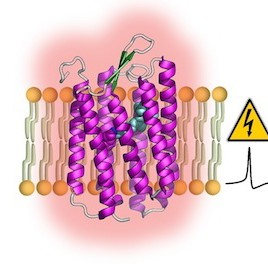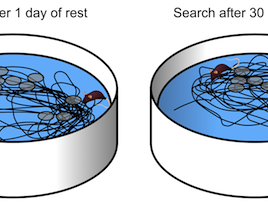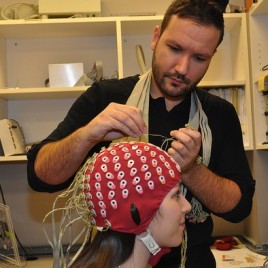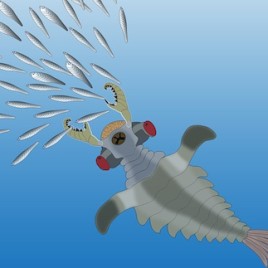New, well-preserved fossils from China suggest that an ancient sea predator may share nervous system features with its modern descendants. Anomalocaridids are creatures from the Cambrian era – over 500 million years ago – first described from fossils found in the Burgess Shale, in British Columbia’s Yoho National Park. The new fossils from China describe […]
Tag: neurology

Bass beats in the brain
A new study helps explain why, in musical cultures from around the world, rhythm is usually played on low-voiced instruments while pitch is played on high-voiced ones. It turns out that when two sounds are played together, the human brain perceives timing differences in low-pitched sounds more easily than those in high-pitched sounds. In the […]

Glowing proteins could help brain imaging
Scientists have developed a new protein capable of glowing red in response to electrical signals in neurons, a tool which could become a boon to brain researchers. The technology could one day be used to produce mice or fish with ‘glowing brains’ that could greatly improve the ability of neuroscientists to understand mental processes. The proteins […]
Transplanted neurons thrive in Parkinson’s-affected brains
Neurons transplanted into the brains of adult patients with Parkinson’s disease 14 years ago are still healthy, a new study shows. Researchers checked on five patients that received transplant of dopamine-secreting neurons from fetal tissue and report that the neurons had not degenerated over time. Parkinson’s disease is caused by loss of dopamine-secreting neurons and […]

How memories become knowledge
An experiment with mice sheds light on how the brain turns individual memories into knowledge over the course of time. Mice were trained to swim in a pool of water and look for a hidden platform that could be in one of several locations, with some locations more likely than others.Mice that were tested one […]
The evolution of self-control
A new study has found species with larger brains (great apes and old-world monkeys) may have more self-control than species with smaller brains (birds and lemurs).

Measuring the brain’s anti-distraction system
Researchers have used EEGs (electoencephalogram) to show that a newly discovered type of neural process that works to overcome a distraction. When your gaze shifts to follow a distraction, neural circuits in your brain gives off signals that can be detected during an EEG. The discovery could help develop new strategies to avoid distracted driving or offer […]

What bird brains can tell us about how we learn
When male songbirds sing to a female, they are note-perfect, but when they are singing by themselves, there are mistakes. By analysing the activity of brain cells, scientists have determined that this random error is actually generated in parts of the brain called the basal ganglia. They suggest that the behaviour is designed to help […]
SMCC Holiday Closure & Top Five of 2013 | News tip
SMCC Holiday Closure and Top Five Science Stories of 2013 | December 20, 2013 The Science Media Centre of Canada will be closed for the holidays from Monday, December 23, 2013 until Friday, January 3, 2014 inclusive. If there is a major breaking news story during these two weeks, we will send out news alerts […]
Detecting Awareness in Vegetative Patients | Webinar recording
Detecting Awareness in Vegetative Patients – November 9, 2011 What if there was an easy, bedside method to diagnose awareness in patients who appeared to be in a vegetative state? And what if new innovations could help those “locked in” patients communicate? On November 9, 2011 the SMCC teamed up with MaRS Discovery District to launch […]
